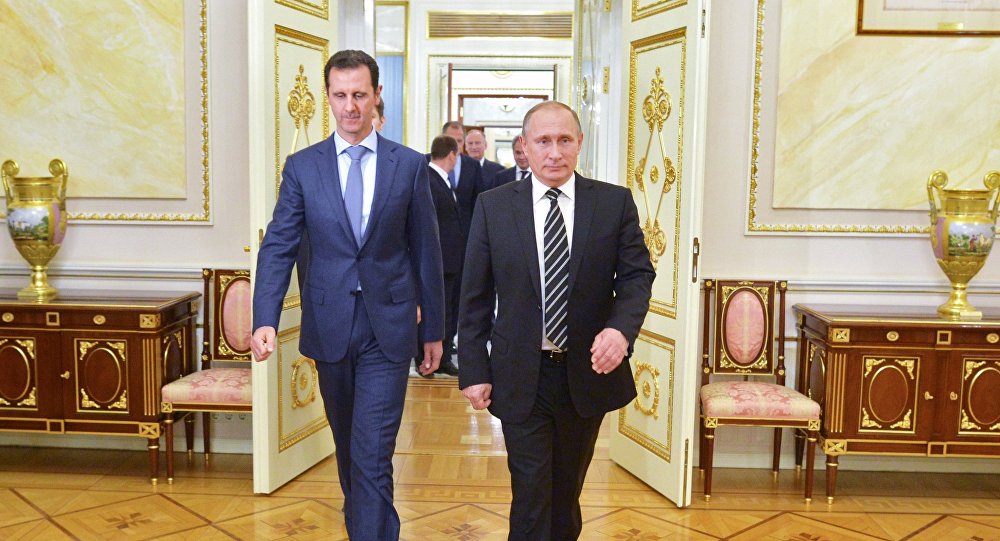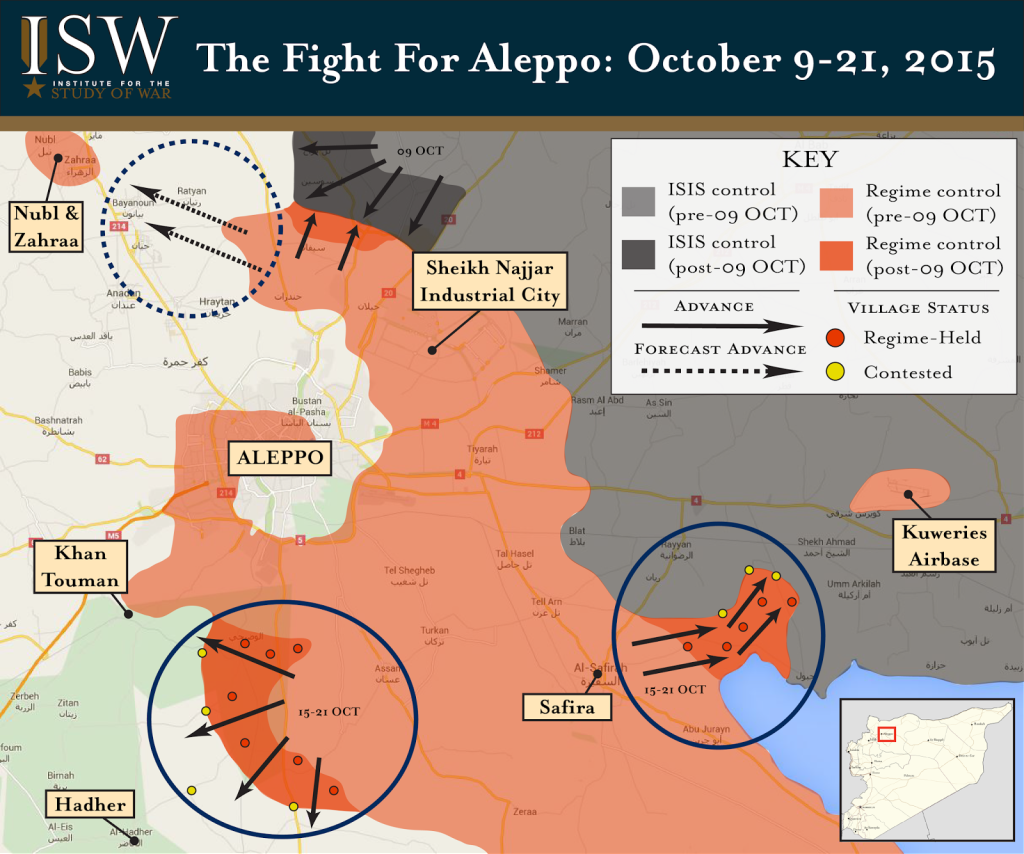PHOTO: President Assad and Russian counterpart Vladimir Putin in Moscow on Tuesday night
LATEST
- Red Cross: Russian Airstrikes Hindering Aid Deliveries and Evacuation of Wounded
- Kurdish Militia: We Will Not Allow Iraqi-Train Syrian Kurds To Return
- Qatar: We Have Not Ruled Out Military Intervention
- Report: Airport in Northeast Syria Closed to Civilian Flights Because of Russian Use
THURSDAY FEATURE
Analysis: Putin’s Logic “We Break It, You Own It”
UPDATE 2145 GMT: President Putin said at meeting in Moscow that he is convinced that President Assad is ready for dialogue with a legitimate opposition.
The Syrian leadership should establish working contacts with those opposition forces that are ready for dialogue. As I understood from my conversation with President Assad the day before yesterday, he is ready for such a dialogue.
Putin even claimed that Assad would be receptive if Moscow supported an armed opposition in Syria ready to fight “terrorists”: “We are thinking it over, and trying, if possible, to translate these agreements to practice.”
However, at the same time, Putin appeared to dismiss all rebel groups opposed to the Assad regime, “It is wrong to juggle with words and say some terrorists are moderate and others not moderate.”
The Russian leader emphasized that military intervention was “absolutely legitimate: “Its single purpose is to contribute to establishing peace,” the president said.
In contrast, he said, “The United States has an aim to get rid of President al-Assad….Our aim is to defeat terrorism; fight terror and help President (Bashar) al-Assad to gain victory over terror.”
UPDATE 1825 GMT: Multiple sources say the Jaish al-Fateh rebel coalition has launched its offensive towards Hama city.
The coalition is reportedly moving on the villages of Atshan, Skeik, and Maan. Pro-opposition accounts are claiming that three regime tanks have already been destroyed.
Jaish al-Fateh promised last week that it would advance in northern Hama Province, countering the regime-Russian offensive that began October 7.
UPDATE 1815 GMT: A “senior Russian official” said on Thursday that Moscow is proposing early Presidential elections in Syria.
President Assad would decide himself whether to run or not, the official said.
Assad claimed to win 89% of the vote in an election against token opposition last June, claiming another seven years in office.
ORIGINAL ENTRY: Russia will hold talks with the US, Turkey, and Saudi Arabia on Friday in Vienna, putting forth its proposal to keep Syria’s President Assad in power during a “political transition”.
The meeting of Foreign Ministers will take place less than 72 hours after Russian President Vladmir Putin’s PR appearance with Assad in Moscow, the first overseas trip by the Syrian President since the country’s uprising began in March 2011.
Putin then spoke to Saudi Arabia’s King Salman and Turkish President Recep Tayyip Erdogan, and Russian Foreign Minister Sergei Lavrov phoned US Secretary of State John Kerry.
Using its military build-up and bombing inside Syria, Moscow has revived its summer proposal for the talks. The US, Britain, and Germany have already shifted position to say Assad can remain for up to six months during discussions, and Turkey joined them earlier this week.
In mid-August, Saudi Arabia blocked the Russian-Iranian inititive when its Foreign Minister said at a Moscow press conference that Assad must leave power before any negotiations can develop. However, Riyadh has indicated this month that it will lift that condition, although without saying how long the Syrian President can remain.
Assad flew to Moscow on Tuesday night for dinner and a photo opportunity with Putin, highlighting the Russian intervention and its strategy with his thanks for the bombing of “terrorists”.
The Russians began their airstrikes, now totaling more than 600, on September 30. About 80% have been on rebel-held territory.
A week later, the Syrian military, alongside Hezbollah and Iranian-supported units, launched the first ground attacks in a six-front offensive across Latakia, Hama, Homs, and Aleppo Provinces. Five of the fronts are against the rebels; the other is against the Islamic State east of Aleppo city.
So far the ground assaults, despite intense Russian bombing, have made only limited gains.
Despite Russian bombardment and the regime offensive, a blood bank in opposition-held Aleppo continues operations:
Red Cross: Russian Airstrikes Hindering Aid Deliveries and Evacuation of Wounded
The Red Cross said on Thursday that Russian airstrikes are hindering deliveries of aid to civilians.
“Air bombardment makes it more difficult for us to reach some areas,” said the head of Middle East and North Africa operations, Robert Mardini. “More use of weapons in any conflict will create additional difficulties in the humanitarian situation.”
Mardini said the Red Croos had been planning to evacuate wounded, under an agreement reached last month, from rebel-held Zabadani in Damascus Province and two regime enclaves in Idlib Province in northwest Syria. However, “now it’s harder because of the beginning of Russian military operations,” he explained.
Thirty-five trucks reached residents of Zabadani and nearby Madaya earlier this week, as aid was also delivered to the enclaves of al-Fu’ah and Kafraya. However, the director of a Zabadani field said there was enough “only for two or three days,” and there are no plans for future shipments.
Warplanes have hit at least seven hospitals since Russia’s bombing began on September 30, according to doctors, activists, and international observers.
On Tuesday, a Russian strike on a field hospital in Sarmin in Idlib Province killed at least 13 people including hospital staff, according to the Syrian American Medical Society and civil defense workers. Moscow denies that it hit the facility.
Kurdish Militia: We Will Not Allow Iraqi-Train Syrian Kurds To Return
Syria’s Kurdish militia YPG has said that they will not allow Syrian Kurds trained by Iraqi Kurdish peshmerga forces to return to Syrian Kurdistan.
In a statement released on Wednesday, a YPG military commander warned that any armed groups under the name of Syrian peshmerga will face trial if they attempt to enter the Syrian Kurdish area of Rojava.
The KRG has trained more than 5,000 Syrian Kurds, whom the US has armed. The KRG and Syrian Kurdish officials have discussed their return to Rojava on several occasions.
Qatar: We Have Not Ruled Out Military Intervention
Qatar’s Foreign Minister Khalid Al-Attiyah said on Thursday that Doha has not ruled out military intervention in Syria if Saudi Arabia and Turkey proposed it.
“From day one, we have made all attempts and knocked on all doors to find a peaceful solution in Syria, but when we saw the bloodshed we had to side with the Syrian people,” al-Attiyah told CNN. “We will spare no effort to do anything that can help protect the Syrian people and Syria from partition, with our Saudi and Turkish brethren, whatever this may be.”
He continued:
If military intervention would protect the Syrian people from the brutality of the Syrian regime, then of course we will do it.
The Syrian people have been fighting on two fronts, against the regime and terrorist groups, for two years. There are many ways to support them.
However, the Foreign Minister put his emphasis on a political resolution, as the Saudi Foreign Minister meets Russian, US, and Turkish counterparts on Friday:
We have two options in the region: conflict, which we always try to avoid, and serious dialogue to resolve our problems. We do not fear confrontation, and we call for dialogue from a position of strength, because we believe in peace, and the shortest path to peace is direct dialogue.
Speaking specifically about Syria’s rebels, al-Attiyah spoke about the leading Islamist group Ahrar al-Sham, supported by Qatar and its allies:
They are not allies of Al-Qaeda. They are a Syrian group fighting to liberate their country. We do not consider them extremists and terrorists. They are part of the moderate opposition.
Report: Airport in Northeast Syria Closed to Civilian Flights Because of Russian Use
The airport in Qamishli in northeast Syria has reportedly been closed to civilian flights because it is being used as a military base for Russian operations.
The airport stopped civilian flights last Friday, with witnesses speaking of hundreds of passengers sitting in the gardens waiting to travel. A pro-regime website, quoting government officials, said on Tuesday that the closure was because planes were being repaired and that the airport would reopen “within the next two days”
Seraj al-Hasakawi, an activist in Hasakah Province, told Syria Direct:
Civilian flights have become extremely rare since the Russian intervention began, because the airport has been used as a military airbase by the regime. The regime is flying a lot of missions, including moving military equipment and injured. The situation has also gotten more hectic because all the different planes flying in Syrian airspace now are preventing civilian flights.
Hasakawi said exceptions were made “for people who have acquaintances or relatives who work in the regime, especially people who know someone who works in the Air Force Intelligence”, albeit on tickets that are now four times the official price.
A pro-regime activist said that Russia’s airstrikes on the Islamic State in Deir Ez Zor Province are all being carried out from the Qamishli airport.


